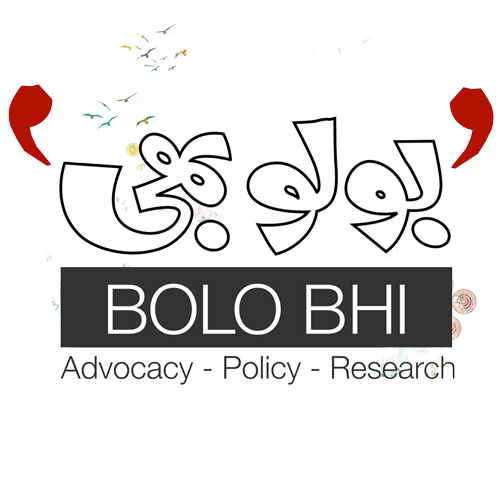Bolo Bhi, which means “speak up” in Urdu, is a non-profit run by a powerful all-female team, fighting for internet access, digital security and privacy in Pakistan and around the world. Founded in 2012 by Sana Saleem and Farieha Aziz, they have since fought tirelessly to challenge Pakistan’s increasingly pervasive internet censorship.
 |

|
“In the year 2012 the government were trying to bring in a national URL filtering firewall along the lines of China,” Farieha Aziz told Index.
“Then came the YouTube ban in September 2012. We lead a campaign against that and got commitments from businesses around the world not to bid for the tender the government of Pakistan had floated.”
The team have now launched countless internet freedom programmes, published research papers, fought for gender-rights, government transparency, executed successful campaigns and run digital security training sessions all over Pakistan.
“In Pakistan the internet is an unlegislated space, so a lot of our work involves discussions law and policy, and the shape they should be taking and the shape they should not be taking,” says Aziz.
Their biggest fight to date has been taking on the draconian Prevention of Electronic Crimes (PEC) Bill. The proposed legislation includes the criminalisation of political criticism and political expression in the form of analysis, commentary, blogs and cartoons, caricatures, memes; “obscene” or “immoral” messages on social media; posting of photographs of anyone on Facebook or Instagram without their permission; and sending an email or message without the recipient’s permission.
“We were able to get a leaked copy [of the bill] and we went public and we started forming an alliance,” said Aziz. “Our part was really to get people on board and collect people to collectively resist the bill in its current form.”
At every stage of the bill’s dramatic progression, Bolo Bhi been tirelessly campaigning against and shedding light on the legislation, which would have otherwise been quietly passed. They have created a timeline tracking cybercrime legislation with information on every development.
They also organised a series of press conferences, media events and campaigns to raise public awareness about the bill, as well as facilitating a series of consultations on the proposed cybercrime law with activists, lawyers and technology experts.
“Over a period of a year from advocating, trying to get the media to talk about it, we saw that a lot of people, even citizens, were very concerned about it. Across the board this concern resonated and nobody wanted the bill in the form it existed. We thought it would pass in a month, but it’s been almost a year and it’s been held off.”
Last year they also took down Pakistan’s Inter-Ministerial Committee for the Evaluation of Websites, filing a petition in the Islamabad High Court challenging the legality of committee, which is responsible for all official decisions taken to block online content in Pakistan. After a court ruling in March 2015, the IMCEW was disbanded – a win for Bolo Bhi, until the Pakistan Telecommunications Authority was given powers for content management on internet. Bolo Bhi continue to fight against the restrictions.
As well as shaping the debate around internet freedom in Pakistan, Bolo Bhi campaigns tirelessly for women’s rights.
“Gender is an integral part of what we do at Bolo Bhi. Recently we’ve tackled acid crimes, which are particularly perpetrated against women. We launched a social media campaign but we’ve also worked with women’s groups.”
Freedom of expression in Pakistan is a complicated phrase, Aziz says. But Bolo Bhi’s work ensures it is not one that is left unexamined.





